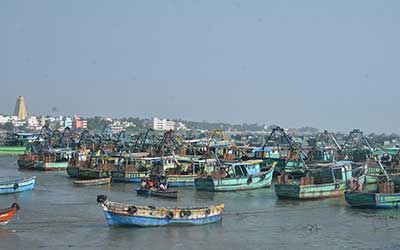Date: 14/11/2022
Relevance: GS-3: Conservation, Environmental Pollution and Degradation.
Key Phrases: Indian Ocean, Fishing vessels, Quad, Indo-Pacific Maritime Domain Awareness, Cape Town Agreement, Agreement on Ports State Measures, Deep-sea fishing trawlers, Maritime Presence, Fish stocks, Marine habitats, Coastal communities, United Nations Convention on the Law of the Sea (UNCLOS), IMAC, Information Fusion Centre-Indian Ocean Region (IFC-IOR).
Context:
- More than 200 Chinese fishing vessels have been monitored in the Indian Ocean in the first half of this year, according to the Indian Navy.
Key Highlights:
- The Quad, comprising India, Australia, Japan and U.S., in May
2022 announced a major regional effort under the ambit of Indo-Pacific
Maritime Domain Awareness (IPMDA).
- It aims to provide a more accurate maritime picture of “near-real-time” activities in the region.
- There are two main regulations globally on IUU fishing: the Cape Town
Agreement and the Agreement on Ports State Measures.
- So far, India is not a signatory of either agreement.
Issues of Illegal Fishing:
- Chinese fishing vessels, fishing vessels from European Union countries and other countries from outside the region were observed to be fishing in the Indian Ocean.
- Around 200-250 Chinese fishing vessels have been monitored in the
Indian Ocean, with a large concentration in the Northern Indian Ocean.
- There is now a huge surge in unregistered Chinese fishing vessels among those operating in the IOR.
- A total of 392 reported incidents of IUU fishing were monitored in 2021 compared to 379 in 2020 in the Indian Ocean.
- There has been a growing incidence of Chinese deep-sea fishing trawlers in the Indian Ocean in addition to an overall rise of China’s maritime presence in the region.
United Nations Convention on the Law of the Sea (UNCLOS)
- It is an international agreement that establishes a legal framework for all marine and maritime activities.
- The Convention resulted from the third United Nations Conference on the Law of the Sea (UNCLOS III), which took place between 1973 and 1982.
- The International Seabed Authority (ISA) is a Kingston,
Jamaica-based intergovernmental body established under the 1982 UN
Convention on the Law of the Sea (UNCLOS).
- The ISA's dual mission is to authorize and control development of mineral related operations in the international seabed and also protect the ecosystem of the seabed, ocean floor and subsoil in the area beyond national jurisdiction.

- Internal waters
- Covers all water and waterways on the landward side of the baseline.
- The coastal state is free to set laws, regulate use, and use any resource. Foreign vessels have no right of passage within internal waters.
- Territorial waters
- Out to 12 nautical miles from the baseline, the coastal state is free to set laws, regulate use, and use any resource.
- Archipelagic waters
- All waters inside the baseline are designated "Archipelagic Waters".
- Contiguous zone
- Beyond the 12-nautical-mile limit, there is a further 12 nautical miles from the territorial sea baseline limit, the contiguous zone.
- Here a state can continue to enforce laws in four specific areas (customs, taxation, immigration, and pollution) if the infringement started or is about to occur within the state's territory or territorial waters.
- Exclusive economic zones (EEZs)
- These extend 200 nm from the baseline.
- Within this area, the coastal nation has sole exploitation rights over all natural resources.
- Foreign nations have the freedom of navigation and overflight, subject to the regulation of the coastal states.
- Continental shelf
- The continental shelf is defined as the natural prolongation of the land territory to the continental margin's outer edge, or 200 nautical miles from the coastal state's baseline, whichever is greater.
- Coastal states have the right to harvest mineral and non-living material in the subsoil of its continental shelf, to the exclusion of others.
- High Sea
- The area outside these areas is referred to as the "high seas".
Negative Impacts of Illegal Fishing:
- IUU fishing depletes fish stocks, destroys marine habitats, and impacts coastal communities, especially in developing countries.
- It causes grave environmental damage, especially when vessels use prohibited gear, such as driftnets, that catche non-target species (like sharks, turtles or dolphins) or physically damage or destroy reefs, seamounts and other vulnerable marine ecosystems.
- Illegal, unreported and unregulated fishing threatens our food supply— preventing it positively empowers the people who rely on oceans for food and income.
- Chinese deep sea trawlers have been a matter of concern for countries in the region, including India, as they are operating far from the Chinese coast and impacting local marine ecology.
Monitoring Framework in India
- All vessel movements on the high seas are monitored by the Indian Navy’s IMAC in Gurugram and the Information Fusion Centre-Indian Ocean Region (IFC-IOR) which is co-located with it.
- IFC-IOR has been collaborating with other regional monitoring centres across the globe to enhance maritime safety and security, including efforts to monitor IUU.
Way Forward:
- Fishing vessels across the world are supposed to have vehicle
management systems installed that not only identify their position but
also require them to record the volume and location of their catch.
- It will help to tackle the issue of IUU fishing.
- Robust regional and international policies with adequate legal frameworks to carry them out.
- Awareness and requirements by seafood markets to hold sellers accountable for implementing policies aimed at eliminating IUU fishing.
Conclusion:
- Illegal fishing threatens the sustainability of the world’s fisheries and the economies of many coastal nations.
Source: The Hindu
Mains Question:
Q. Illegal fishing in the Indian Ocean region is seen as having environmental as well as security concerns. Critically analyse the statement. (150 Words).








